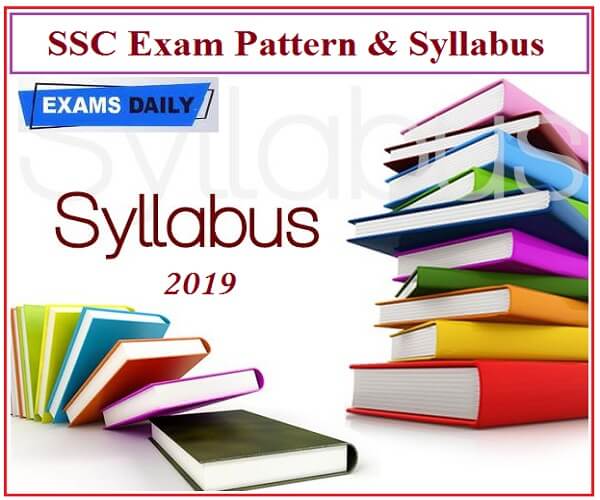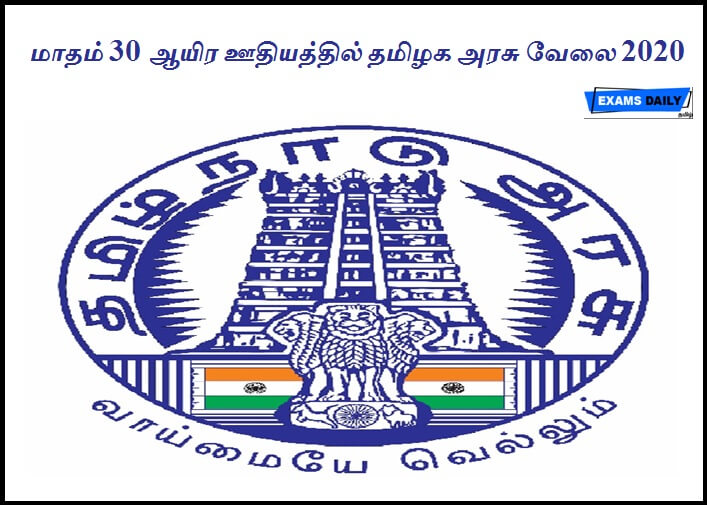SSC Phase 7 Syllabus & Exam Pattern PDF has been given in the SSC Official Notification. Staff Selection Commission has released Notification for the Various types of posts. Here we have given SSC Syllabus & Exam Pattern details in our examsdaily.in website.
Selection Process for SSC:
The Selection process and criteria for SSC Recruitment 2019 is Written Examination.
SSC Exam Pattern:
Hence, by keeping this as a reference, the candidate must prepare well for the coming examinations.
| Part | Subject | No. of Questions | Max.Marks | Total Duration |
| A | General Intelligence | 25 | 50 |
60 Minutes (80 minutes for candidates eligible for scribes as per paras 11 E (i) and 11 E (ii) |
| B | General Awareness | 25 | 50 | |
| C | Quantitative Aptitude (Basic Arithmetic Skill) | 25 | 50 | |
| D | English Language (Basic Knowledge) | 25 | 50 |
SSC Syllabus:
Matriculation Level
English:
- Vocabulary, Grammar, Sentence Structure, synonyms, antonyms and its correct usage, etc
Quantitative Aptitude:
- Number System & Simplification, Computation of Whole Numbers, Decimals and Fractions and relationship between Numbers, Fundamental arithmetical operations, Percentages, Ratio and Proportion, Averages, Interest, Profit and Loss, Discount, use of Tables and Graphs, Mensuration, Time and Distance, Ratio and Time, Time and Work, etc.
General Awareness:
- Questions relating to India and its neighbouring countries especially pertaining to Sports, History, Culture, Geography, Economic scene, General Polity including Indian Constitution, and Scientific Research etc
General Intelligence:
- Questions of non-verbal type.The test will include questions on similarities and differences, space visualization, problem solving, analysis, judgment, decision making, visual memory, discriminating observation, relationship concepts, figure classification, arithmetical number series, non-verbal series etc.
Higher Secondary Level
English:
- Spot the Error, Fill in the Blanks, Synonyms/ Homonyms, Antonyms, Spellings/ Detecting Mis-spelt words, Idioms & Phrases, One word substitution, Improvement of Sentences, Active/ Passive Voice of Verbs, Conversion into Direct/ Indirect narration, Shuffling of Sentence parts, Shuffling of Sentences in a passage, Cloze Passage, Comprehension Passage.
Quantitative Aptitude:
- Number Systems, Computation of Whole Number, Decimal and Fractions, Relationship between numbers Fundamental arithmetical operations: Percentages, Ratio and Proportion, Square roots, Averages, Interest (Simple and Compound), Profit and Loss, Discount, Partnership Business, Mixture and Allegation, Time and distance, Time and work. Algebra
General Awareness:
- Questions are designed to test the candidates general awareness of the environment and its application to the society.
General Intelligence:
- Questions of both verbal and non-verbal type. The test will include questions on Semantic Analogy, Symbolic operations, Symbolic/Number Analogy, Trends, Figural Analogy, Space Orientation ,Semantic Classification, Venn Diagrams, Symbolic/Number Classification, Drawing inferences, Figural Classification, Punched hole/pattern-folding & unfolding, Semantic Series.
Graduation and above Level
English:
- Candidates ability to understand correct English, his basic comprehension and writing ability, etc. would be tested.
Quantitative Aptitude:
- Number Systems, Computation of Whole Number, Decimal and Fractions, Relationship between numbers Fundamental arithmetical operations: Percentages, Ratio and Proportion, Square roots, Averages, Interest (Simple and Compound), Profit and Loss, Discount, Partnership Business, Mixture and Allegation, Time and distance, Time and work. Algebra
General Awareness:
- Questions are designed to test the candidates general awareness of the environment and its application to the society.
General Intelligence:
- Questions of both verbal and non-verbal type This component may include questions on analogies, similarities and differences, space visualization, spatial orientation, problem solving, analysis, judgment, decision making, visual memory, discrimination, observation, relationship concepts, arithmetical reasoning and figural classification, arithmetic number series, non-verbal series, coding and decoding, statement conclusion, syllogistic reasoning etc.
Download SSC Phase 7 Syllabus in PDF
Click here to SSC official Website
[table “5708” not found /]






